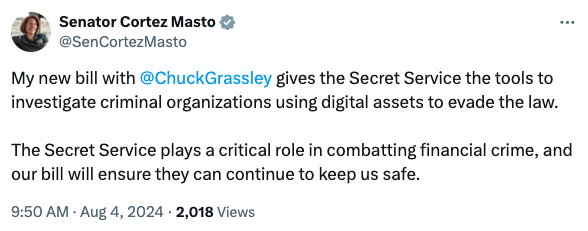
On August 2, Senators Catherine Cortez Masto of Nevada and Charles Grassley of Iowa introduced a significant legislative proposal titled the “Combatting Money Laundering in Cyber Crime Act of 2024.” This bill aims to bolster the capabilities of the U.S. Secret Service to tackle the evolving challenges posed by cryptocurrency-related crimes.
The proposed legislation seeks to extend the Secret Service’s jurisdiction, particularly over transactions conducted by unlicensed money transmitting businesses and potential fraudulent activities targeting U.S. financial institutions. Senator Cortez Masto emphasized the critical nature of this expansion, stating, “The funding of criminal activity through digital assets poses a direct threat to the security and safety of our nation.”

The Need for Stronger Assessments
Senator Grassley highlighted the necessity of robust threat assessments to effectively target and dismantle “seedy financial enterprises” that facilitate money laundering. He advocated for heightened federal oversight to improve the capacity of law enforcement to preempt and tackle financial crimes facilitated through digital currencies.
Blockchain forensics firm Chainalysis reported that illicit addresses laundered approximately $22.2 billion worth of cryptocurrencies in 2023, marking a significant decrease from $31.5 billion in 2022. Despite this reduction, the threat remains substantial, underscoring the need for the proposed legislative measures.
In contrast to the rising concern over digital currencies, the U.S. Treasury, in February, reaffirmed that traditional cash transactions still dominate as the preferred method for money laundering among criminals in the U.S. Nonetheless, federal agencies including the Treasury, Department of Justice, Securities and Exchange Commission, and the Commodity Futures Trading Commission continue to intensify efforts to curtail cryptocurrency-related crimes.
The Secret Service’s Dual Mandate
Traditionally tasked with the protection of high-profile political figures and safeguarding the financial infrastructure of the U.S., the Secret Service’s role has expanded to include more complex cybercrime. This was highlighted in July when the agency’s competence was questioned following a failed assassination attempt on Republican candidate Donald Trump.
Complementing this bill, the U.S. House recently passed the Financial Technology Protection Act on July 23. This act is designed to combat illicit activities involving cryptocurrencies while ensuring that consumer choices remain protected.
| Agency | Action Taken | Impact |
|---|---|---|
| U.S. Treasury | Highlighted cash as primary laundering method | Contextualizes crypto risks |
| DOJ | Increased crypto crime prosecutions | Enhances legal enforcement |
| SEC & CFTC | Regulatory actions against crypto frauds | Provides market stability |
The introduction of the “Combatting Money Laundering in Cyber Crime Act of 2024” represents a crucial step in adapting U.S. law enforcement capabilities to the digital age. By enhancing the Secret Service’s powers, the bill aims not only to curb the immediate threats posed by cryptocurrency crimes but also to fortify the overall integrity of the nation’s financial systems.
Featured image credit: Freepik
Follow us for more breaking news on DMR
